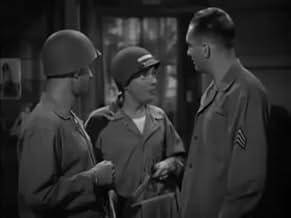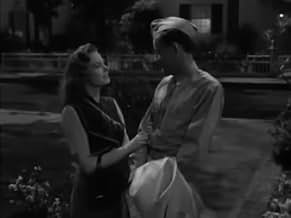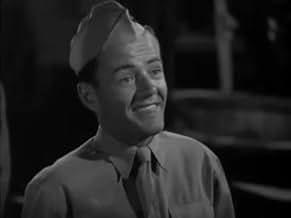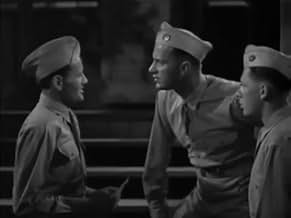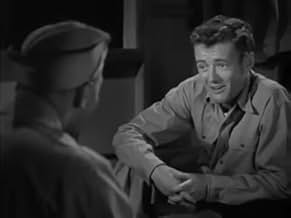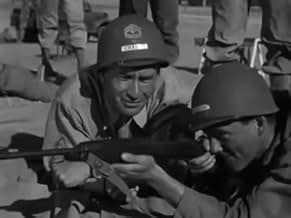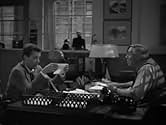Marion Hargrove, a journalist, joins the Army to write about his training experiences. During basic training at Fort Bragg, he navigates with the aid of friends who aim to share his writing ... Read allMarion Hargrove, a journalist, joins the Army to write about his training experiences. During basic training at Fort Bragg, he navigates with the aid of friends who aim to share his writing income.Marion Hargrove, a journalist, joins the Army to write about his training experiences. During basic training at Fort Bragg, he navigates with the aid of friends who aim to share his writing income.
- Director
- Writers
- Stars
- Awards
- 2 wins & 1 nomination total
William 'Bill' Phillips
- Pvt. Bill Burk
- (as Wm. 'Bill' Phillips)
Margaret Adden
- Undetermined Role
- (unconfirmed)
- (uncredited)
Morris Ankrum
- Col. Forbes
- (uncredited)
Rod Bacon
- Field Operator
- (uncredited)
Steve Barclay
- Corporal
- (uncredited)
Robert Benchley
- Mr. Holliday
- (uncredited)
- Director
- Writers
- All cast & crew
- Production, box office & more at IMDbPro
Featured reviews
Reporter Hargrove (Walker) is drafted and begins his basic training. He decides to keep a record of it all to later turn into a book.
I find this one of the more entertaining and realistic depictions of army training while preparing for war overseas. It is a fun film and if you have done basic training as myself some +25 years ago (in Europe) this rings quite true. I was a bit of a goofup in the beginning, just like Hargrove, and made quite a mess but it turned out allright in the end and even made sergeant. I can sure identify with Hargrove : he does mean well but somehow it nearly always goes wrong. The depiction of life in the barracks in spot-on with the grumpy sergeants and rather distant officers. Even the manoeuvres ring true. And when did you ever witness a scene where artillerymen in training are learning to adjust the range of their heavy guns ?
Walker is absolute excellent as Hargrove : he reminds me of a young Jack Lemmon. The direction is top notch and the movie is really fast-paced. It sure compares favourably with other army 'comedies' of that time, like 'Up in Arms', also made in 1944 (with Danny Kaye) which even has a scene with a beehive of pretty nurses suntanning on a battleship.
It mostly reminds me of its British counterpart 'The Way Ahead"' by Carol Reed and Peter Ustinov, also made in 1944. If you liked this I highly recommend that one.
I find this one of the more entertaining and realistic depictions of army training while preparing for war overseas. It is a fun film and if you have done basic training as myself some +25 years ago (in Europe) this rings quite true. I was a bit of a goofup in the beginning, just like Hargrove, and made quite a mess but it turned out allright in the end and even made sergeant. I can sure identify with Hargrove : he does mean well but somehow it nearly always goes wrong. The depiction of life in the barracks in spot-on with the grumpy sergeants and rather distant officers. Even the manoeuvres ring true. And when did you ever witness a scene where artillerymen in training are learning to adjust the range of their heavy guns ?
Walker is absolute excellent as Hargrove : he reminds me of a young Jack Lemmon. The direction is top notch and the movie is really fast-paced. It sure compares favourably with other army 'comedies' of that time, like 'Up in Arms', also made in 1944 (with Danny Kaye) which even has a scene with a beehive of pretty nurses suntanning on a battleship.
It mostly reminds me of its British counterpart 'The Way Ahead"' by Carol Reed and Peter Ustinov, also made in 1944. If you liked this I highly recommend that one.
Military men seemed to have some sort of great adoration for Donna Reed in this kind of movie. It occurs to me that this was made possible because of Robert Walker's performance as Marion Hargrove. Think about how good he is in this role, to be so convincing that real-life soldiers can identify with him to the point they believe his girl in the movie might be their girl, too.
But the legacy of the film and its lasting impact comes from the experiences of Hargrove, a war correspondent known for his humorous essays. The essays became the basis for a book which became the basis for this film. And it did so well at the box office that MGM commissioned a sequel which again starred Mr. Walker, though Miss Reed was not in it.
The real-life Marion Hargrove went on to write screenplays and television scripts. He wrote many westerns and episodes of 'The Waltons' which in its later seasons depicts the conflicts of World War II, which Mr. Hargrove experienced first-hand.
But the legacy of the film and its lasting impact comes from the experiences of Hargrove, a war correspondent known for his humorous essays. The essays became the basis for a book which became the basis for this film. And it did so well at the box office that MGM commissioned a sequel which again starred Mr. Walker, though Miss Reed was not in it.
The real-life Marion Hargrove went on to write screenplays and television scripts. He wrote many westerns and episodes of 'The Waltons' which in its later seasons depicts the conflicts of World War II, which Mr. Hargrove experienced first-hand.
Robert Walker plays an extremely skinny private in the United States Army during the midst of World War Two. He scrubs lots of garbage cans and gets to woo a lovely Donna Reed. As an "in the army" genre movie the film has more of a peace time vibe to it than one that was produced during the biggest war of the twentieth century. It would be hard to imagine Germany or Japan cranking out cinematic fluff like this in 1944. It perhaps reflects the fact that the mainland of the United States was not suffering the effects of total war like other countries. The lighthearted tone also might indicate the underlying confidence the country was feeling about ultimately winning the war at the time.
Criticized for bad reporting, young Robert Walker (as Marion Hargrove) saves himself from getting fired (yet again) by receiving his draft letter from President Franklin D. Roosevelt. Off to basic training in Fort Bragg, North Carolina, Mr. Walker meets manipulative Private Keenan Wynn (as Mulvehill) and gullible Private George Offerman Jr. (as Orrin Esty) en route. They will become fast friends, with Mr. Wynn eventually getting Walker and himself cushy office transfers. However, when their old platoon gets orders to join the fighting forces, patriotic Walker and Wynn want in on the action. The good news is Walker's furloughs include quality kissing time with pretty Donna Reed (as Carol Halliday). The bad news is he has to scrub clean a lot of garbage cans. Walker is endearing enough to make cameo-appearing Robert Benchley, as Ms. Reed's veteran father, seem more annoying than funny.
***** See Here, Private Hargrove (3/18/44) Wesley Ruggles ~ Robert Walker, Keenan Wynn, Donna Reed, George Offerman Jr.
***** See Here, Private Hargrove (3/18/44) Wesley Ruggles ~ Robert Walker, Keenan Wynn, Donna Reed, George Offerman Jr.
Private Hargrove (Robert Walker) is one of the most inept Privates in the US Army and much of the film consists of the Sergeants trying to somehow turn this numb-skull into a decent soldier. But it all seems hopeless and we should be awfully glad there weren't more like him in the service--or else the war might have gone the other way! Oddly, however, I did notice that almost all the soldiers were skinny little squirts--the must rugged among them being Keenan Wynn! In some ways, the film plays a bit like "No Time For Sergeants" but without the hillbilly angle--consisting of a series of screw ups and comedic situations in boot camp and very, very little evidence that an actual war is taking place! However, the film takes a romantic turn when Walker is tricked into a date with lovely Donna Reed. When the two fall in love, the joke's on the fellows who set him up with her. This part of the film is quite sweet and helps to create a more well-rounded film--not just a typical army comedy. And, because he now has some focus in his life, he improves as a soldier and actually is promoted to acting Corporal...which takes him completely by surprise. So can Hargrove get the girl AND be a success in the Army? Tune in and see.
Overall, this is a very slight but pleasant film. Sure, it's a piece of fluff...but nice fluff. There is a sequel--which I have not yet seen. Considering that this was a decent and likable film, I might just give "What next, Corporal Hargrove?" a look.
Overall, this is a very slight but pleasant film. Sure, it's a piece of fluff...but nice fluff. There is a sequel--which I have not yet seen. Considering that this was a decent and likable film, I might just give "What next, Corporal Hargrove?" a look.
Did you know
- TriviaMarion Hargrove asked permission to consult on the movie, but the Army denied his request. He had been promoted to sergeant by the time this picture was completed. The Army even denied his request to see a preview of the film.
- Quotes
Pvt. Marion Hargrove: I'm so used to K.P. that even in Fayetteville, if I see a garbage can on the street, I stop and polish it.
- ConnectionsFollowed by What Next, Corporal Hargrove? (1945)
- SoundtracksIn My Arms
(1944) (uncredited)
Lyrics by Frank Loesser
Music by Ted Grouya
Variations played in the opening credits and often throughout the movie
Sung by Bob Crosby and the soldiers in the canteen
Partially sung later by Robert Walker with modified lyrics
Details
- Release date
- Country of origin
- Language
- Also known as
- Oiga señor recluta
- Filming locations
- Camp Roberts, California, USA(summer scenes)
- Production company
- See more company credits at IMDbPro
- Runtime
- 1h 41m(101 min)
- Color
- Aspect ratio
- 1.37 : 1
Contribute to this page
Suggest an edit or add missing content


